The AMD Ryzen 5 1600X vs Core i5 Review: Twelve Threads vs Four at $250
by Ian Cutress on April 11, 2017 9:00 AM ESTBenchmarking Performance: CPU Web Tests
One of the issues when running web-based tests is the nature of modern browsers to automatically install updates. This means any sustained period of benchmarking will invariably fall foul of the 'it's updated beyond the state of comparison' rule, especially when browsers will update if you give them half a second to think about it. Despite this, we were able to find a series of commands to create an un-updatable version of Chrome 56 for our 2017 test suite. While this means we might not be on the bleeding edge of the latest browser, it makes the scores between CPUs comparable.
SunSpider 1.0.2 [link]
The oldest web-based benchmark in this portion of our test is SunSpider. This is a very basic javascript algorithm tool, and ends up being more a measure of IPC and latency than anything else, with most high performance CPUs scoring around about the same. The basic test is looped 10 times and the average taken. We run the basic test 4 times.
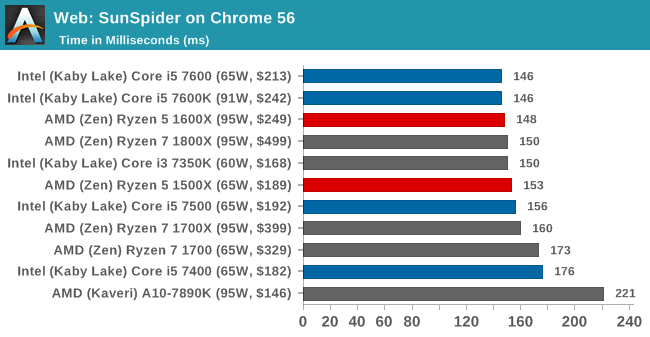
Mozilla Kraken 1.1 [link]
Kraken is another Javascript based benchmark, using the same test harness as SunSpider, but focusing on more stringent real-world use cases and libraries, such as audio processing and image filters. Again, the basic test is looped ten times, and we run the basic test four times.
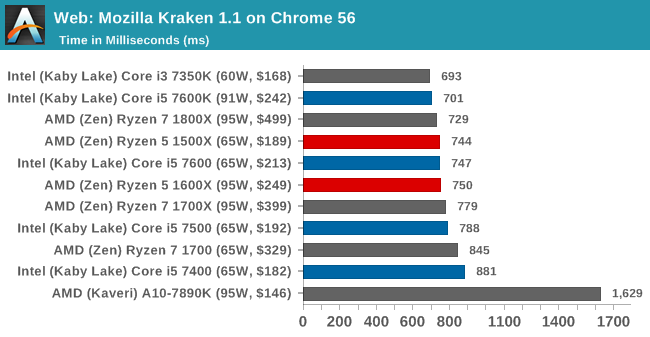
Google Octane 2.0 [link]
Along with Mozilla, as Google is a major browser developer, having peak JS performance is typically a critical asset when comparing against the other OS developers. In the same way that SunSpider is a very early JS benchmark, and Kraken is a bit newer, Octane aims to be more relevant to real workloads, especially in power constrained devices such as smartphones and tablets.
WebXPRT 2013 and 2015 [link]
While the previous three benchmarks do calculations in the background and represent a score, WebXPRT is designed to be a better interpretation of visual workloads that a professional user might have, such as browser based applications, graphing, image editing, sort/analysis, scientific analysis and financial tools. Web2013 is the older tool, superceded by Web2015, however both still are highly relevant for high-performance web applications today.
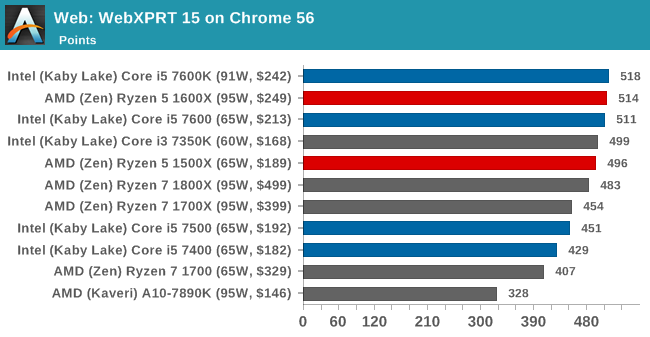


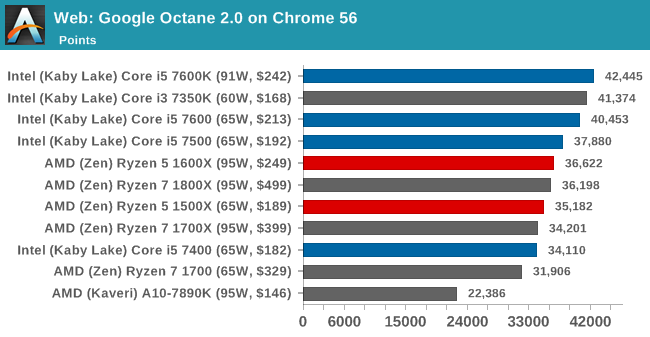
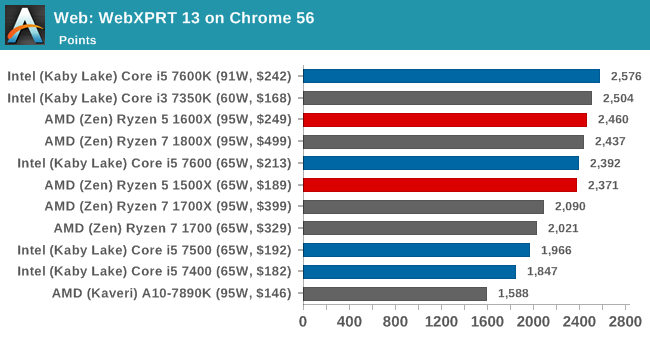








254 Comments
View All Comments
Shadowmaster625 - Tuesday, April 11, 2017 - link
The main reason to buy a 7600K over Ryzen is so you can actually go above 4.1GHz. Given how easy it is to clock a 7600K at 4.7GHz or even higher, it is highly disingenuous to not include overclocked results on the graphs.sor - Tuesday, April 11, 2017 - link
I think the overclocking niche is aware that they can do better. I agree that more data is better, but I certainly don't think there's any responsibility for Anandtech to provide overclocking results for either platform.Maybe they'll follow up with a comparison on how Ryzen 5 overclocked compared to the competition.
Meteor2 - Wednesday, April 12, 2017 - link
How much does OC'ing help? Presumably not at all with gaming unless you're on a 1080 or higher, and how does it help multi-threaded production workloads?Notmyusualid - Tuesday, April 18, 2017 - link
My thoughts exactly - my buddies' 7600K runs 24/7 @ 5GHz, on a 240mm closed loop rad.It was the snappiest computer I've yet used...
dhotay - Tuesday, April 11, 2017 - link
*shoo-inhttps://www.merriam-webster.com/dictionary/shoo-in
Achaios - Tuesday, April 11, 2017 - link
"We have already shown in previous reviews that the Zen microarchitecture from AMD is around the equivalent of Intel’s Broadwell microarchitecture"I don't think so, Ian. Case in point:
1. Intel Core i7-7700K @ 4.20GHz- 4.50 GHz Turbo (KABY LAKE): 2,595 MARKS PASSMARK SINGLE THREADED
2. Intel Core i7-6950X @ 3.00GHz- 3.50 GHz Turbo (BROADWELL): 2,135 MARKS PASSMARK SINGLE THREADED
3. AMD 1800X 3.6 GHz - 4.0 GHz Turbo(RYZEN): 1,952 MARKS PASSMARK SINGLE THREADED
Out of curiosity, I benched my own 4770k at 4.5 GHZ, the frequency I game on:
4. Intel 4770K 3.50 GHz - 4.53 GHz OC (HASWELL): 2610 MARKS PASSMARK SINGLE THREADED
http://imgur.com/FrHmYlG
It's not even the bloody equivalent of Haswell, man, much less that of Broadwell.
sor - Tuesday, April 11, 2017 - link
No, you're cherry picking. It's pretty well documented that IPC is about broadwell level, if you want to get into a benchmark posting war you'll run out of material far sooner. I can even find huge wins for Ryzen, but I'm not going to cherry pick those to try to show a big discrepancy.Achaios - Tuesday, April 11, 2017 - link
How about you go ahead and cherrypick to prove me wrong on Single Threaded performance. Oh now wait, you can't b/c Ryzen is slow as molasses in January.https://www.cpubenchmark.net/singleThread.html
MrSpadge - Tuesday, April 11, 2017 - link
Apart from WinrAR 5.2 that's pretty slippery molasses:http://www.zolkorn.com/en/amd-ryzen-7-1800x-vs-int...
fanofanand - Tuesday, April 11, 2017 - link
And the cherry picking continues."How about you go ahead and cherrypick to prove me wrong on Single Threaded performance"